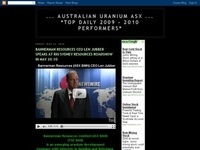Published on Tuesday Oct 19 2010

Reg Howard-Smith, Chamber of Minerals and Energy WA
“I refuse to condemn uranium mining in Australia, I think it’s going to be part of the solution…we need to have the best regulatory framework in the world that will satisfy all Australians that we are doing our utmost to make sure this fuel is as safe as it possibly can be.”
Dr Tim Flannery – scientist, environmentalist, Australian of the Year 2007.
Confronted by the challenge of climate change and rising energy demands, it’s hardly surprising the Cold War-inspired case against uranium mining is increasingly out of step with the views of community leaders and leading environmentalists.
The reality is that commercial demand for uranium will continue, with overseas countries looking to nuclear power for a secure, reliable source of base-load electricity, which does not pollute the air, nor add to carbon emissions.
There are now more than 440 reactors in operation across 30 countries. Another 60 plants are under construction. Earlier this year, President Barack Obama approved $8.3b(US) in loan guarantees, to build the first nuclear power plants on American soil in thirty years. China will build another 28 nuclear plants by 2020 – a key plank of the country’s strategy to cut greenhouse gas emissions.
With extensive reserves, a stable sovereign profile and a rigorous approvals system, Australia is well-placed to help meet the world’s energy needs, in a safe, responsible manner.
In fact, some commentators would go as far to say we are morally obliged to play our part in reducing global dependence on fossil fuels.
As we enter this new climate-energy paradigm, it must be remembered Australia has mined and exported uranium for more than half a century.
These days, it’s sold strictly for electricity generation, under the terms of the Nuclear Non-Proliferation Treaty. In Australia, yellowcake mining and transport is heavily regulated, with close to a dozen state and federal departments and agencies administering the industry.
Claims in some quarters of an acute risk to human health are simply not supported by science, nor the experience of uranium mining in other states and territories.
Each year, the typical uranium mine worker is exposed to about 5 millisierverts (the unit of measurement of biological effects of radiation) – similar to that of a commercial airline pilot. To put this in context, the world-wide population average is 2-3mSv and a CAT scan 10-20mSv. The bottom-line – radiation exposure for those involved in mining and transport remains very low.
In Western Australia, changing community attitudes have been reflected in government policy.
Since the ban on uranium mining was lifted two years ago, a new sector has emerged from the state’s dusty interior. The first mines could be in production by 2013, however the socio-economic benefits are already being delivered.
In the last financial year, $55m was spent by companies exploring for uranium in WA – almost double the figure for 2008-09. Conservatively, it’s estimated the industry could deliver $460m in state revenue by 2030.
If just one of the current projects achieves production, it will create hundreds of jobs, including opportunities for Aboriginal employment. Importantly, it will broaden the export base of the state’s minerals sector and strengthen the regional economies, from where these resources will be extracted.
And contrary to claims of widespread opposition, right now, companies are engaging with communities and regulators alike. To date, the response from civic leaders and residents has been encouraging. For example, the Shire of Wiluna recently declared its support for continued uranium exploration in the area. Furthermore, the shire has publicly stated it’s prepared to consider approvals to mine, on the basis proponents comply with all statutory requirements, including health and environmental, and can demonstrate the project’s socio-economic benefits to the region.
As an industry, we welcome this willingness to objectively examine the facts and issues.
The Greens should drop the fear-driven rhetoric and follow suit – it’s time the party reviewed its position and recognised that an outdated ideology is threatening WA jobs, regional economies and global efforts to tackle climate change.

Reg Howard-Smith is the Chief Executive of the Chamber of Minerals and Energy of Western Australia
Visit my other site Australian Uranium Investing
 Australian Uranium News - Research
Australian Uranium News - Research

No comments:
Post a Comment